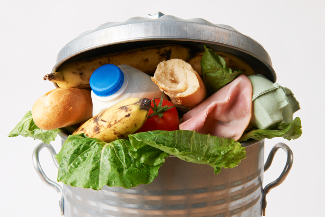Member State Page : Luxembourg
Last updated on the 29/09/2023

Per capita: 147 kilos in 2020
In total: 92 580 tonnes in 2020
In total: 83 622 tonnes in 2021

Primary production: 7 384 tonnes in 2020
Processing and manufacturing: 10 692 tonnes in 2020
Retail and other distribution of food: 8 525 tonnes in 2020
Restaurants and food services: 8 739 tonnes in 2020
Households: 57 240 tonnes in 2020

Reduce food waste by 50% by 2030
Target
In line with the Sustainable Development Goal Target 12.3, the objective to reduce food waste by 50% by 2030 is enshrined in the national waste and resource management plan, as well as in the governmental program for 2018-2023.
Measure
The amount and composition of food waste in Luxembourg were estimated based on data from various waste statistics, on the results of a survey of selected companies in the distribution and food processing chain, results of the 2018/2019 analysis of mixed municipal waste, and a range of secondary and tertiary data. The Environmental Agency carries out compositional analyses of household waste on a regular basis, measuring also the ratio of food waste.
The 2018/2019 analysis, indicates a food waste volume of 70,800 tonnes, disposed each year by the catering, retail and hospitality sectors, as well as by households. On average, each citizen throws away 118 kilos of food per year, of which about 48 kilos could be avoided. Per consumer and day, 0.35 kilos of food ends up in the bin.
The study shows that the total amount of food waste in all sectors increased by about 4.8%, as compared to 2016. However, food waste per capita decreased by 3.8%. The majority of food waste is produced in households. In Luxembourg, 53,270 tonnes of food, or about 88.5 kilos per capita annually, are disposed every year, mixed with municipal waste, organic waste and compost. As Luxembourg has 602,000 inhabitants (as of 2018), this represents about 75% of the total food waste. The avoidable share is estimated at 14,200 tonnes or 23.5 kilos per capita per year (-31%).
Act
The national waste and resource management plan (2018) has a dedicated section to food waste, with various measures foreseen in order to reach the target to halve food waste by 2030. Actors across the food supply chain are involved in implementing these measures through working groups or concrete projects.
The national waste strategy Null Offall Lëtzebuerg (Zero Waste Luxembourg) contains a road map for valorising food, including actions to prevent and reduce food waste, based on the following principles:
- the involvement of all relevant stakeholders across the food supply chain;
- working on infrastructures and tools (food banks, awareness raising activities etc.);
- reviewing regulations and standards (endorsement of prevention plans at industry, retail level, in hospitals);
- increasing communication (establishment of a food council);
- using economic tools (the ‘polluter pays principle’, tax incentives in case of food donations).
Food waste measures have been integrated in the new draft of the national waste law (Loi modifiée du 21 mars 2012 relative aux déchets), including the obligation for businesses to put in place waste prevention and management plans (also covering food waste).
The new national waste legislation includes a specific paragraph on food waste and the food use hierarchy, prioritising food donation over other destinations for surplus food. It includes practical measures such as specific food waste prevention plans for supermarkets and the right for consumers to take-away meal leftovers from restaurants in ‘doggy bags’.
Most of the Luxembourgish communes, as well as several canteens, have signed the national solidarity pact against food waste. A special training developed by a private company in collaboration with the Ministry of Agriculture is helping municipalities to tackle food waste.
In order to facilitate food donation, guidance has been developed to help food business operators and redistribution organisations to apply the correct hygiene rules. The guidance is accompanied by an information sheet for the HORECA sector on the legal aspects concerning food donation, developed by the Chamber of Crafts, the HORECA sector and the relevant ministries. The national waste legislation allows the possibility to use tax incentives for food donations, in order to prevent surplus food from going to waste.
The Ministry of Environment, Climate and Sustainable Development and the Environmental Administration have jointly implemented the project Clever Iessen (Clever Eating), encouraging consumers to eat sustainably and aiming to reduce food waste through the use of the Ecobox, a reusable ‘doggy bag’ box. The Ecobox is a reusable container in two sizes that allows customers to take home food from restaurants, canteens, take-aways and other establishments after placing a deposit of €5.
A nationwide information and education campaign Ensemble contre le gaspillage alimentaire (‘Together against food waste’) has been launched in 2016 and has since then been updated every year. All relevant information and actions can be found on the dedicated website Antigaspi. The website provides useful information for the public on storing food, cooking with leftovers, the difference between ‘use by’ and ‘best before’ date labels, among other. The issue of food waste is also addressed in other campaigns, such as the national campaign to promote local food Vun eise Baueren, frësch fir Iech.
Since March 2017, a travelling exhibition on food waste has been touring through Luxembourg. Each element of the exhibition covers a specific topic concerning food waste e.g. clever food shopping, storing, portioning and cooking. Usually, the exhibition is displayed in primary schools, but can be booked (free of charge) for any kind of event. In addition, cooking shows have been broadcasted on TV to showcase examples of how to cook with leftovers. The Ministry of Sustainable Development and Infrastructure sponsored a TV series called Manner ass méi (Less is more) about different types of waste, including food waste, in an effort to raise awareness about these issues.
Several schools have signed up to the national solidarity pact against food waste and have incorporated food waste in their regular activities and subjects. Within the framework of Mini-enterprises school projects, activities that develop ideas about how to combat food waste receive financial support.
Private companies can book food waste prevention trainings through the professional chamber or the website Lifelong learning.
The Ministry of Agriculture offers financial support to food waste prevention initiatives through the Antigaspi platform and launches call for projects on a yearly basis to identify innovative ideas in tackling food waste in Luxembourg. Initiatives aiming to reduce food waste can request the permission to use the logo of the Antigaspi campaign. The logo shows that the initiative has the support of the Ministry of Agriculture and is a way to increase the visibility of the actions and projects.
